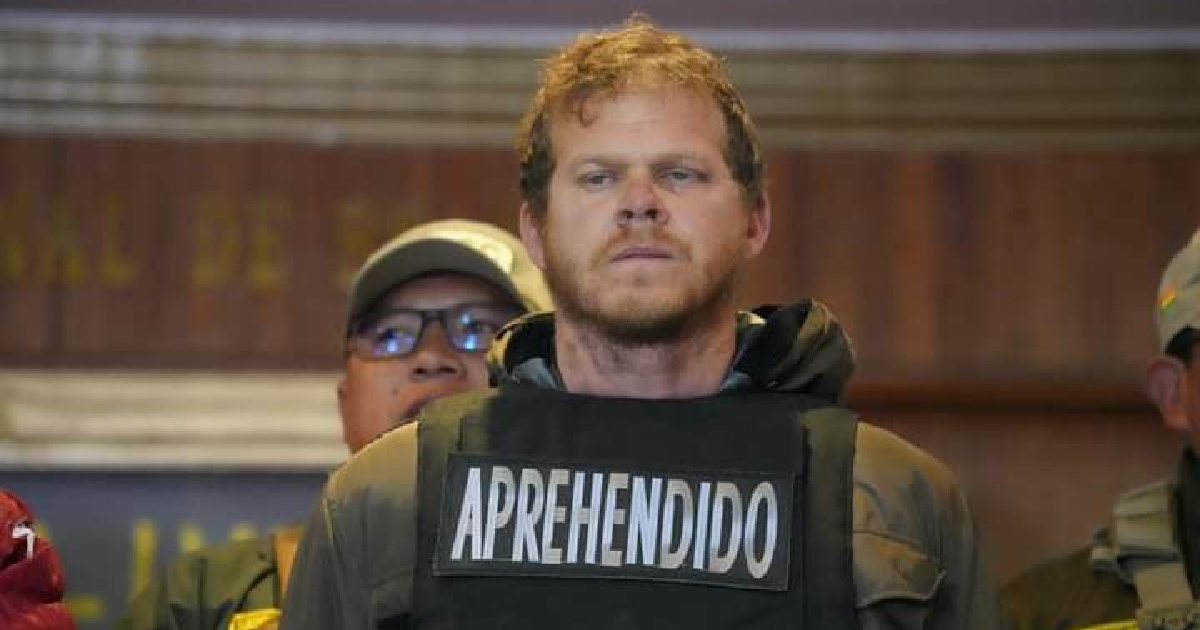The lawyer representing Yarinel Martínez Maqueira, the Cuban implicated in the murder of three people in La Paz, Bolivia, during a robbery, claims her client was hired to provide protection during the cash transfer. A ballistics test will determine the actual perpetrator of the crime.
In recent statements to the local press, Mónica Irusta asserted that Martínez was involved as security to safeguard the 700,000 bolivianos the victims were to pay for the purchase of 100,000 dollars, allegedly sold by the accused in the case. According to Irusta, the Cuban was promised a payment of 10,000 bolivianos for his services.
“We are not asking for the simple freedom of my client, but there should be a differentiation in the degree of involvement in this unfortunate incident,” she emphasized.
Martínez was apprehended last Tuesday, alongside Bolivians Omar and Norman Copaja Chuquimia and Jorge Catalán Osinaga, for their suspected role in the shooting death of three young individuals on Saturday, August 24, while they were heading to the Los Yungas area with the false promise of a favorable currency exchange, according to authorities.
The suspects fatally shot Verónica Aguirre, 34, Domingo Santos Mamani, 33, and José Luis Vargas, 27. Bolivian authorities have classified the killings as executions. According to police reports, the victims sustained gunshot wounds to the head, "from the nape forward," as explained by Bolivia’s Government Minister, Eduardo del Castillo, during a press briefing on Tuesday.
“They were executed,” Del Castillo declared, adding that the three also had neck wounds inflicted by a sharp object post-mortem. Del Castillo stated that the four detainees are responsible for the three deaths and face charges of murder, which carries a maximum sentence of 30 years in prison.
Legal Proceedings and Arrests
In a hearing on August 28, the court decided that all accused individuals should be sent to Chonchocoro, Bolivia’s maximum-security prison, on a preventive basis. However, Martínez's lawyer argued for distinguishing the levels of involvement in the crime, an argument that was challenged in the hearing.
“We cannot lump them all together because it is incoherent to assume that four individuals fired the weapon. There had to be a principal perpetrator who discharged the firearm,” she contended. “This will become clear, I estimate, in about a month, as the glove test has been conducted on the four individuals.”
The attorney mentioned that they are still determining the specific charges Martínez could face. “This will be decided by the crucial glove test,” she emphasized.
According to the police report, the victims were persuaded to purchase dollars by Omar Copaja Chuquimia, identified by the Bolivian press as a childhood friend of Domingo Santos Mamani. Copaja offered the currency at a rate of 7.10 or 7.50 bolivianos per dollar, close to the official exchange rate (1 dollar x 6.96 bolivianos), while black market rates exceed 11 bolivianos per dollar.
To complete the transaction, the three young individuals were convinced to travel from El Alto to Los Yungas, where they were supposed to meet another person with the dollars. Trusting the connection between the men, the victims boarded a minibus rented by Copaja, which also carried the other three suspects.
During the journey, the accused convinced the victims to stop and “bless” the money they were about to exchange, likely to verify the amount. They then proceeded to Unduavi, where in a location known as “Tres Marías,” they shot the victims to steal their money.
The bodies were discovered on Monday by a farmer in a wooden and tin hut. Following preliminary investigations, the police arrested the four suspects on August 27 and raided two properties.
Martínez was detained in a construction site he was guarding in Ciudad Satélite, El Alto. At this location, police found the 9mm firearm used in the murders and 7.62mm caliber bullets, typically used in high-caliber weapons. They also found a backpack containing 2,800,000 bolivianos stolen from the victims.
According to René Tambo, director of the Special Force to Fight Crime (FELCC) in La Paz, the murder was planned two weeks in advance. “Each participant had their 'task' assigned, they scouted the route, and planned their actions,” reported the newspaper Opinión. “They did not have dollars; their intention was to rob the money and end the lives of the victims.”
The heinous crime has sparked widespread shock and outrage in Bolivia. Investigations are ongoing, and the prosecution is expected to present an indictment within six months, leading to a trial before a court.
Yarinel Martínez Maqueira is originally from Nueva Gerona, Isla de la Juventud. He obtained permanent residency in Bolivia in 2023 and has a five-year-old son born in the South American country.
Key Questions on the Triple Murder and Robbery in Bolivia
Given the gravity and complexity of the crime involving Yarinel Martínez Maqueira, several questions arise about the investigation and legal proceedings. Here are some key questions and answers related to the case:
What role did Yarinel Martínez Maqueira allegedly play in the crime?
Martínez’s lawyer claims he was hired to provide security during the cash transfer and was not the principal perpetrator of the murders.
What evidence has been found against the suspects?
Police found a 9mm firearm used in the murders and 7.62mm caliber bullets at the construction site where Martínez was arrested, along with a backpack containing 2,800,000 bolivianos stolen from the victims.
What are the potential legal outcomes for the suspects?
The suspects face charges of murder, which carries a maximum penalty of 30 years in prison. The degree of each suspect's involvement will be determined by ongoing investigations and forensic tests.
